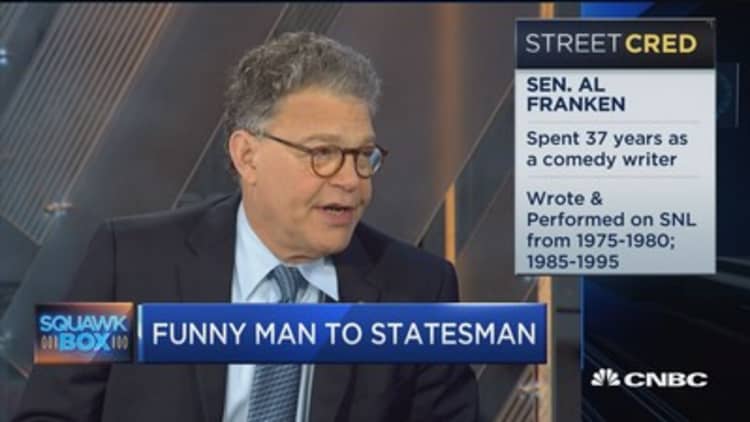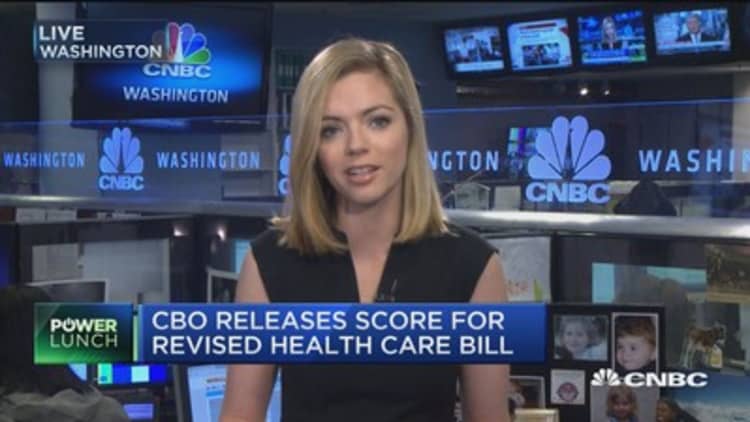Pennsylvania health insurers are asking for prices of their Obamacare plans to rise by an average of less than 9 percent in 2018 — but also warn rate increases could be more than quadruple that if President Donald Trump guts two key parts of the Affordable Care Act.
The requested rate hikes in the Keystone State are much lower than those being sought in several other states. The steep price increases requested elsewhere reflect projected fallout from potential actions by the Trump administration and Congress.
However, Pennsylvania's insurers were asked to price their Obamacare plans next year — at least for now — at levels that assume those actions won't happen.
The five insurers that sell individual health plans in Pennsylvania have asked Insurance Commissioner Teresa Miller to raise aggregate prices of those plans by 8.8 percent, according to Miller, who also noted that no insurer plans to leave the Obamacare market.
That rate is sharply lower than the average rate hike of 32.5 percent that Miller signed off on for this year in an effort to avoid big financial losses by health plans.
But Miller also said that if Congress, at the behest of Trump, repeals the Obamacare rule requiring most Americans to have some form of health insurance or pay a fine, insurers would seek a rate increase of 23.3 percent statewide next year.
The Republican bill known as the American Health Care Act, which is pending in Congress, seeks to repeal that so-called individual mandate.
And if the Trump administration stops reimbursing insurers for a critical Obamacare subsidy to low-income customers, insurers would ask for rate hikes of 20.3 percent, Miller said.
But "if both changes occurred, insurers estimate they would seek an increase of 36.3 percent," according to a statement released by Miller's office.

Trump has both called for a repeal of Obamacare's individual mandate, and has threatened to cut off the reimbursements to insurers.
The reimbursements, known as cost-sharing reductions, are for discounts in the out-of-pocket health costs charged to low-income Obamacare customers by their insurance plans.
More than half of Obamamcare customers nationally get those discounts. Insurers expect to be paid about $7 billion in reimbursements for them by the federal government this year. Their fate has been called into question both by a court challenge to them by the Republican-led House of Representatives and by Trump's hostility toward the Affordable Care Act. The GOP's bill would formally kill the cost-sharing reductions.
A spokeswoman for Miller told CNBC that insurers would be able to resubmit their rate requests later this year if either the mandate was repealed or if the CSR reimbursements ceased.
"Information provided by insurers shows the extent to which instability and changes would impact Pennsylvania's 2018 health insurance rates," said Miller, whose state's residents buy Obamacare plans on HealthCare.gov and outside of that federal insurance exchange.
"This proves what we already know — instability caused by adverse action from the federal government will do nothing but hurt consumers who are stuck in the middle," said Miller.
"The 506,000 Pennsylvanians with Affordable Care Act-compliant plans in the individual market deserve single-digit rate increases like the ones most people will see if Congress and the Trump administration choose not to risk consumers' health and financial well-being by jeopardizing the stability of these markets," she said.
Independence Blue Cross, the market leader for Obamacare plans in the Philadelphia area, told CNBC that its rate submissions reflected guidance from Miller's Insurance Department, and relied "on state and federal regulations as they stand today."
But, "Given the legislative and regulatory uncertainty around health care reform, it may be necessary to reevaluate our proposed rates before they are finalized," said Independence Blue Cross CEO Daniel Hilferty.
"As such, it is critical that the federal government commit to funding cost-sharing reductions to avoid disruption in the market and to ensure those with low and moderate incomes get the care they need," Hilferty said.
The other insurers selling plans in Pennsylvania are Capital Blue Cross, Geisinger Health Plan, Highmark and UPMC Health Plan.
Last week, Blue Cross and Blue Shield of North Carolina, that state's largest Obamacare insurer, said it wanted to hike premiums in 2018 by an average of 22.9 percent. The insurer said that most of that price increase reflected the failure of Trump and congressional Republicans to guarantee continued reimbursements to insurers for the cost-sharing reductions.
Blue Cross and Blue Shield of North Carolina said it would have asked for average rate increases of just 8.8 percent if those payments were guaranteed. That is the same average rate being sought by Pennsylvania insurers, who have assumed the payments would continue.
In other states, including Maryland, Connecticut, Oregon, Virginia, as well as in the District of Columbia, insurers also have asked for double-digit percentage price hikes, and pointed to uncertainty about the cost-sharing reduction payments as a key factor in those premium requests. CareFirst Blue Cross Blue Shield has asked for rate increases of more than 50 percent in Maryland, 35 percent in parts of Virginia and 29 percent in Washington, D.C., according to The Washington Post.
Andy Slavitt, former head of the federal Centers for Medicare and Medicaid Services, has estimated that uncertainty over the cost-sharing reduction reimbursements could, by itself, add almost 20 percent to the price of Obamacare plans next year.
Kevin Counihan, former CEO of HealthCare.gov, said the relatively low rate increases sought by Pennsylvania insurers "underscores the impact of engaged issuers and regulators in stabilizing the ACA marketplace."
"It also shows the risk of continued ambiguity around CSR funding and individual mandate enforcement," Counihan said.
"All new and broad social programs, particularly market-based ones, require time to adjust. The results from Pennsylvania are the most recent example of engagement and patience."
Watch: Ryan says health care bill won't force young families to overpay for care



